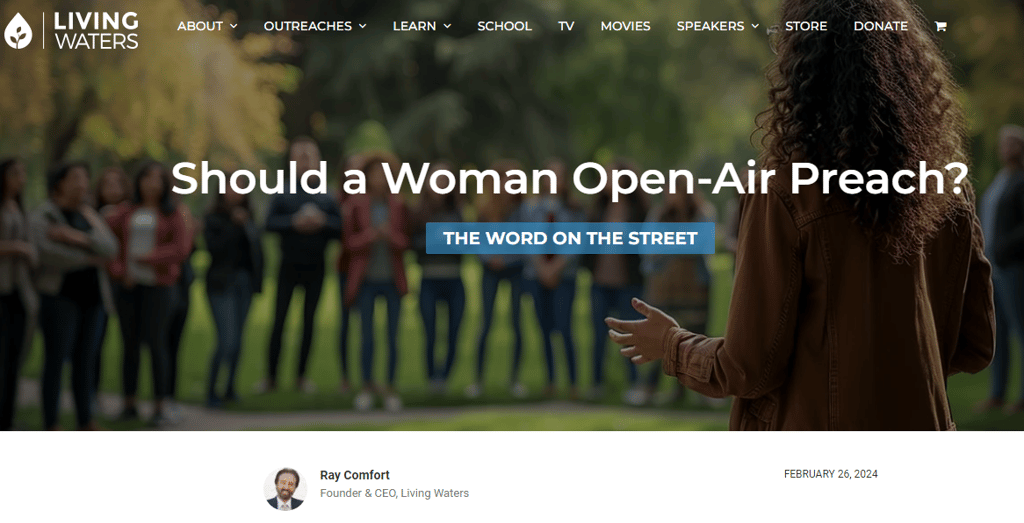A Response to “Should a Woman Open-Air Preach?” by Ray Comfort
Dr. B shows that the idea of "open-air" preaching is not a special case.
Dr. B
5/30/20246 min read


My post content
(https://livingwaters.com/should-a-woman-open-air-preach/)
Barry Carpenter, Th.D.
May 29, 2024
Ray Comfort begins by saying that the prohibitions of women teaching men, as found in 1 Timothy 2 and 1 Corinthians 14, are limited to a church setting and do not apply outside the church setting. Are there different standards with God? Is His primary concern for the situation or location? Comfort bypasses the major issue to focus on the minor. For the sake of argument, let us assume that the prohibitions of women preaching and teaching men are restricted to only a church setting. If that is the case, then para-church ministries like Beth Moore are acceptable as long as their venues are not in a church setting. Or, would it be permissible for a woman to start a mixed Bible study in her home, as it is not a church setting? Obviously, historically, such as these have been forbidden by the church. Firstly, the church is under the authority of elders. And all ministries would need to be approved by elders based on the standard that they conform to Scripture. Secondly, the issue is not the setting. Women are not to teach men in areas pertaining to Scripture or doctrine, whether in their homes, in a coffee shop, or in a church setting. Why? Because of the creation ordinance, by which God gave authority and responsibility to men.
“But I do not allow a woman to teach or exercise authority over a man, but to remain quiet. For it was Adam who was first created, and then Eve. And it was not Adam who was deceived, but the woman being deceived, fell into transgression.”
In 1 Timothy 2, I concur that Paul is addressing believers and the Epistle is sent to a church. Let us focus on the immediate context. Would Mr. Comfort be willing to be consistent and say that the instructions to pray “on behalf of all men” are limited only to a church setting? Paul says, in verse 8, “Therefore, I want men in every place to pray...” It is obvious that this is not limited to a church setting or service. Continuing on, should women only dress modestly in a church setting (v. 9)? I recognize the absurdity of my argument, but the point is that these commands apply to all settings. I should further add that there is no mention of women being preserved through their gospel proclamation, but rather by their God-given duties as a wife and a mother (v. 15).
Comfort argues that the heralding of the Gospel is not limited to men. He says:
“The Bible doesn’t say, ‘How beautiful are the feet of the men who preach the gospel of peace . . .’ (Romans 10:15) or ‘Go [men] into all the world and preach the gospel to every creature’ (Mark 16:15). In both cases, the word ‘preach’ is the Greek word kerysso, which means ‘to herald (as a public crier).’”
Please note 1 Corinthians 14:21 says: “In the Law it is written, ‘By men of strange tongues and by the lips of strangers I will speak to this people, and even so they will not listen to Me,’ says the Lord.”
This verse specifically mentions that it will be men who speak in tongues as a witness of judgment to the nation of Israel. This is a case of Comfort ignoring the clear statement in the same context (1 Corinthians 14) that men speak and arguing from silence that women can speak.
Comfort: “Whether you are a man or a woman, you are commanded to preach the gospel—to raise your voice as a town crier.”
The natural question that follows is do we see in Scripture a woman doing that? The answer is no, we do not. Comfort does attempt to give us examples. He tells us that the woman at the well was a Gospel witness. His argument is that in John 4:28, she witnessed and many Samaritans believed. In John 4, we see that the women left the well and reported to the men in the city that there was a man “who told me all things” (v. 28–29). In v.30, “They went out of the city and were coming to him.” They believed there was a prophet present because of the testimony of the woman (v. 39). They came to Jesus “and heard for themselves” (v.41). It was not the preaching of the woman that converted them. In fact, there is no mention of her preaching or anything of a Gospel presentation given by the woman in this passage. They came and believed because they heard Christ.
Comfort uses R.A. Torey and the Salvation Army as examples of ministers and ministries that allowed women to preach the gospel. I find these examples irrelevant, as Scripture alone is our authority. No doubt, in history, we could find many assemblies practicing numerous aberrations in opposition to Scripture. This is a poor way to make an argument.
Comfort quotes several passages to prove that women worked with Paul in the gospel and I assume he means in the direct presentation of the gospel through open-air preaching, as that is his thesis. One such passage is Philippians 4:3, where Paul mentions there were “women who labor with me in the gospel.” Again, this is an argument from silence. There is no mention in the text that these women were gospel, open-air preachers. In chapter 1, Paul refers to “all the saints...who are in Philippi” as having “participation in the gospel.” This is a common phrase found in the letters of Paul. It does not mean that each and every person was an open-air preacher. In many cases, Paul uses the phrase in reference to those who offered assistance to him and who gave him financial support.
Comfort uses Prisca (Romans 16:3) as an example to justify the idea that women can open-air preach. He overlooks the fact that Prisca is not acting alone. She ministers with her husband, Aquila, and would be under his authority. No where is there an account given in Scripture where Prisca was preaching, in the open-air or elsewhere. He goes on to reference other feminine names mentioned in Paul's greetings as he closes out chapter 16. I do not know how this supports the case of Comfort. The mere fact is that there were men and women in the church of Rome that Paul sent his greeting to.
Comfort: “I thank God that He chose women rather than men to be first to herald the good news of the resurrected Savior. These faithful women took the good news to a group of hard-hearted, faithless men who were cringing in fear behind locked doors. That makes me wonder if the men who want women to be in silence preach in the open air themselves.”
This is a sad attempt. First, these women were not heralding the Gospel. They were bringing news of the resurrection. Secondly, they did not go to unbelievers, but to disciples. Third, they were not preaching in an open or closed setting. Finally, to add that men want to silence women out of their guilt for not doing open-air preaching is a pathetic appeal. This assumes all men are called to preach in the open air. And it is an emotional appeal rather than a sound presentation of biblical proof.
No presentation regarding women ministers would be complete without mentioning Deborah. And Comfort does not disappoint. Judges 4 tells us she was a prophetess and acting judge of the nation. The missed point here is that the nation was under judgment. The Bible tells us that when women rule, it is a curse. In Isaiah 3, God says he will bring judgment on the nation by removing their leaders (v. 1–3). He will allow them to be ruled by lads (v.4), children (v.5), and “women will rule over them” (v.12). The appeal to Deborah as a shining example of how God uses women in the ministry backfires. Deborah’s acting as a judge is a sign of judgment against the nation. Perhaps we can be consistent and say that when women are ruling, teaching, and exercising ministerial authority, it is a sign of God’s judgment on the church. Also, this verse is a prescriptive, historical narrative and not an imperative from God.
What Comfort has done is conflate and reduce evangelism to only open-air proclamation. There are ways to share the gospel without preaching. Furthermore, Comfort would wish us to believe that God has one set of standards for ministry within the church service and a different set of standards for ministry outside the Church. What would happen if we modified the question from "Should a woman open-air preach?" and asked instead, “Can women preach?” The answer to the second question would be a resounding, “No.” The Bible does not allow a woman to preach. Regardless of content, audience, setting, or situation, it is not permitted. Whether here, there, in the church, or in the open air, God forbids a woman to preach.
